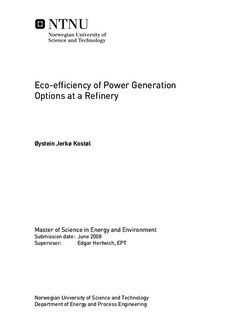Eco-efficiency of Power Generation Options at a Refinery
Master thesis
Permanent lenke
http://hdl.handle.net/11250/234221Utgivelsesdato
2008Metadata
Vis full innførselSamlinger
Sammendrag
This master thesis is investigating environmental performance of different alternatives for Combined Heat and Power (CHP) production from Natural Gas (NG) at Mongstad oil refinery. An important objective is to evaluate CHP plants with Carbon Capture and Storage (CCS), and the performance of these compared to a conventional CHP without such application. Life Cycle Assessment (LCA) is the applied methodology for environmental assessment. The LCA results are used to inspect changes in eco-efficiency at the refinery with introduction of a CHP plant.Three CHP configurations have been assessed: 1. Conventional CHP2. Conventional CHP with Post-Combustion (PC) CCS3. Autothermal Reforming (ATR) plant; CHP with pre-combustion CCSThe three alternatives are denoted Conventional, PC and ATR in the following.Global Warming Potential (GWP) emissions per MWh exergy produced from the three CHP s are 56, 100 and 337 kg CO2-equvivalents for the PC, ATR and Conventional respectively. It is concluded that up-and downstream emissions do not undermine the environmental benefit of applying CCS regarding GWP impacts.The CCS systems have significantly higher impacts of Human Toxicity (HTP), Acidification (AP) and Eutrophication Potentials (EP). HTP impacts are over 50% higher for CCS systems compared to Conventional. Increased NH3 and NOx emissions make up much of the 100-150% rise in AP and EP impacts. It is considered possible that flue gas handling can mitigate a substantial fraction of the increased AP and EP impacts. The system expansion reveal that building a Conventional CHP at Mongstad will not lead to global CO2 reductions if it substitutes renewable electricity production. The CCS systems unreservedly give net global CO2 reductions, disregarding alternative electricity production technology.The GWP eco-efficiency at Mongstad is defined as total LCA emissions from refinery output products divided by the economic value of the products. Introducing a CHP with CCS would significantly improve the eco-efficiency. Installing a Conventional plant, however, would deteriorate eco-efficiency. Installing a CHP with CCS is hence considered a significant step towards a sustainable development at Mongstad refinery. Given improved flue gas handling of NOx and NH3, additional environmental effects are not considered to have potential of jeopardizing this conclusion.
